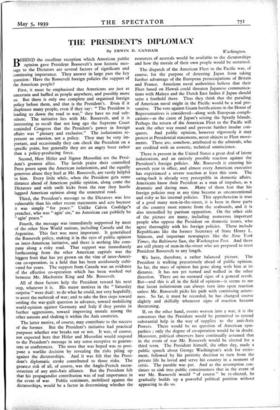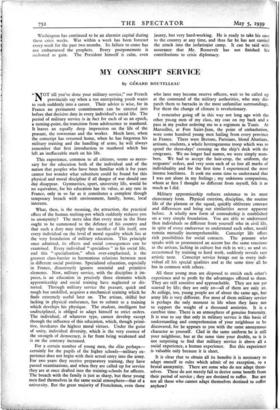THE PRESIDENT'S DIPLOMACY
By ERWIN D. CANHAM
Washington.
BEHIND the excellent reception which American public opinion gave President Roosevelt's now historic mes- sage to the Dictators are several factors of significant and continuing importance. They answer in large part the key question: Have the Roosevelt foreign policies the support of the American people?
First, it must be emphasised that Americans are just as uncertain and baffled as people anywhere, and possibly more so. But there is only one complete and organised foreign policy before them, and that is the President's. Even if it displeases many people, even if they say: "The President is leading us down the road to war," they have no real sub- stitute. The initiative lies with Mr. Roosevelt, and it is interesting to recall that not long ago the Supreme Court reminded Congress that the President's power in foreign affairs was " plenary and exclusive." The isolationists re- present an emotion, not a policy. They may be very im- portant, and occasionally they can check the President on a specific point, but generally they are an angry buzz rather than a policy-producing force.
Second, Herr Hitler and Signor Mussolini are the Presi- dent's greatest allies. The lavish praise their controlled Press pours upon the American isolationists, and the equally generous abuse they hurl at Mi. Roosevelt, are vastly helpful to him. Every little while, when the President gets some distance ahead of American public opinion, along come the Dictators and with swift kicks from the rear they hustle laggard American opinion along the unneutral road.
Third, the President's message to the Dictators was less vulnerable than his other recent statements and acts because it was simply " for peace." Unlike Calvin Coolidge's preacher, who was " agin' sin," no American can publicly be " agin' peace."
Fourth, the message was immediately supported by most of the other New World nations, including Canada and the Argentine. This fact was most important. It generalised the Roosevelt policy, making it in the eyes of public opinion an inter-American initiative, and there is nothing like com- pany along a risky road. That support was immediately forthcoming from the other American capitals was the biggest fruit that has yet grown on the vine of inter-Ameri- can co-operation, in a field that has been assiduously culti- vated for years. The support from Canada was an evidence of the effective co-operation which has been worked out between Mr. Mackenzie King and Mr. Roosevelt.
All of these factors help the President toward his next step, whatever it is. His major motives in the " Saturday surprise " were dual : to do what he could, not very hopefully, to avert the outbreak of war; and to take the first steps toward settling the war-guilt question in advance, toward mobilising world-opinion against Germany and Italy if they persist in further aggressions, toward improving morale among the other nations and shaking it within the Axis countries.
The latter motive, of course, may contribute to the success of the former. But the President's initiative had practical purposes whether war breaks out or not. It was, of course, not expected here that Hitler and Mussolini would respond to the President's message in any sense receptive to guaran- tees or conferences. The most that was hoped was to post- pone a warlike decision by revealing the risks piling up against the dictatorships. And it was felt that the Presi- dent's diplomatic stroke contributed to those risks. The greatest risk of all, of course, was the Anglo-French recon- struction of any anti-Axis alliance. But the President felt that his propagandist contribution was of real importance in the event of war. Public sentiment, mobilised against the dictatorships, would be a factor in determining whether the resources, of neutrals would be available to the dictatorships and how the morale of their own people would be sustained.
The dispatch of the American Fleet to the Pacific was, of course, for the purpose of deterring Japan from taking further advantage of the European preoccupations of Britain and France. American naval authorities believe that their Fleet based on Hawaii could threaten Japanese communica- tions with Malaya and the Dutch East Indies if Japan should seize a foothold there. Thus they think that the parading of American naval might in the Pacific would be a real pre- ventive. The vote against Guam fortifications in the House of Representatives is considered—along with European compli- cations—as the cause of Japan's seizing the Spratly Islands. Perhaps the return of the American Fleet to the Pacific will work the other way round and prevent further insular con- quests. And public opinion, however vigorously it may protest at Presidential statements, never objects to Fleet move- ments. These are, somehow, attributed to the admirals, who are credited with an esoteric, technical omniscience.
There is present in the United States a great deal of latent isolationism, and an entirely possible reaction against the President's foreign policies. Mr. Roosevelt is entering his seventh year in office, and almost every American executive has experienced a severe reaction at least this soon. The swing-back is already very perceptible in domestic affairs. Americans know their President as a man of impulses, as a dramatic and daring man. Many of them fear that his foreign policies may at any time become as unconventional and risky as his internal policies. This apprehension is true of a good many men-in-the-street, it is keen in those parts of the country most remote from the seaboards, and it is also intensified by partisan opposition. On the other side of the picture are many, including numerous important people who oppose the President on domestic issues, who agree thoroughly with his foreign policies. These include Republicans like the former Secretary of State Henry L. Stimson, and important newspapers like the New York Times, the Baltimore Sun, the Washington Post. And there are still plenty of men-in-the-street who are prepared to trust President Roosevelt to any length.
We have, therefore, a rather balanced picture. The President is walking precariously ahead of public opinion. So far, the mass of opinion has gone along with him at its distance. It has not yet turned and walked in the other direction. There are no outward signs of a general revolt. But—and this is all in the field of opinion—it seems to me that latent isolationism can always turn into open reaction unless Mr. Roosevelt picks his path with continuing astute- ness. So far, it must be recorded, he has changed course slightly and skilfully whenever signs of reaction became threatening.
If, on the other hand, events worsen into a war, it is the consensus that the President would be permitted to extend substantial help in the way of supplies to the anti-Axis Powers. There would be no question of American sym- pathies ; only the degree of co-operation would be in doubt. Moreover, political observers have continually assumed that in the event of war Mr. Roosevelt would be elected for a third term. The President himself, the other day, made a public speech about George Washington's wish for retire- ment, followed by his patriotic decision to turn from the private life he loved and serve his country in a moment of crisis. The parable was pat. And as the assumption con- tinues to sink into public consciousness that in the event of war Mr. Roosevelt would " of course " be re-elected, he gradually builds up a powerful political position without appearing to do so. Washington has continued to be an alarmist capital during these crisis weeks. War within a week has been forecast every week for the past two months. Its failure to come has not embarrassed the prophets. Every postponement is reckoned as gain. The President himself is calm, even jaunty, but very hard-working. He is ready to take his case to the country at any time, and thus far he has not carried the attack into the isolationist camp. It can be said with assurance that Mr. Roosevelt has not finished his contributions to crisis diplomacy.















































 Previous page
Previous page